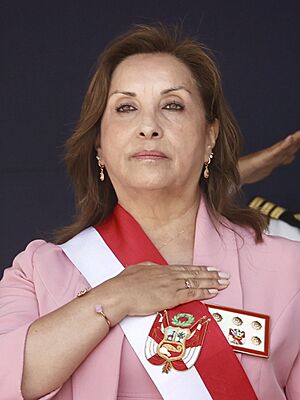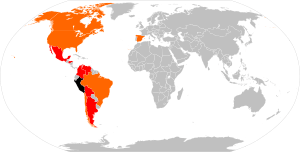Dina Boluarte facts for kids
Quick facts for kids
Excelentísima Señora
Dina Boluarte
|
|
|---|---|

Boluarte in 2024
|
|
| 64th President of Peru | |
| Assumed office 7 December 2022 |
|
| Prime Minister | Pedro Angulo Arana Alberto Otárola Gustavo Adrianzén |
| Vice President | First Vice President Vacant Second Vice President Vacant |
| Preceded by | Pedro Castillo |
| First Vice President of Peru | |
| In office 28 July 2021 – 7 December 2022 |
|
| President | Pedro Castillo |
| Preceded by | Martín Vizcarra (2018) |
| Succeeded by | Vacant |
| Minister of Development and Social Inclusion | |
| In office 29 July 2021 – 26 November 2022 |
|
| President | Pedro Castillo |
| Preceded by | Silvana Vargas |
| Succeeded by | Cinthya Lindo Espinoza |
| Personal details | |
| Born |
Dina Ercilia Boluarte Zegarra
31 May 1962 Chalhuanca, Peru |
| Political party |
|
| Spouse |
David Gómez Villasante
(m. 1992) |
| Children | 2 |
| Education | University of San Martín de Porres (LLB) |
| Signature | |
Dina Ercilia Boluarte Zegarra ( ; born 31 May 1962) is a Peruvian politician, civil servant, and lawyer who has been serving as the 64th president of Peru since 2022. She served as the first vice president and minister at the Ministry of Development and Social Inclusion under President Pedro Castillo. Before then, she had served as an officer at the National Registry of Identification and Civil Status (RENIEC) from 2007 until 2022. With Boluarte assuming the presidency as the sole vice president, President of Congress Alejandro Soto Reyes is next in the line of succession.
Boluarte is the first woman to become President of Peru.
Contents
Early life and education
Boluarte was born in Chalhuanca, Apurímac on 31 May 1962. She graduated as a lawyer from the University of San Martín de Porres and did postgraduate studies at that university.
Early career
In 2004, she co-authored a book, The Recognition of Human Rights and International Humanitarian Law, which was later investigated for plagiarism after 55% of the text included was marked as plagiarized from a 2002 post on the National Human Rights Commission of Mexico's website according to Turnitin software.
She has worked at National Registry of Identification and Civil Status as an attorney and officer since 2007. She ran unsuccessfully for mayor of Lima's Surquillo district in 2018, representing the Free Peru party. She also participated in the extraordinary parliamentary elections in 2020 for Free Peru, though she did not obtain a congressional seat.
Vice presidency (2021–2022)
Election
In the 2021 presidential election she was part of the presidential ticket of Pedro Castillo, which was victorious in the run-off.
During the campaign, Boluarte was widely viewed to position herself more moderately than Castillo, saying that she would not support overriding the Constitutional Court of Peru, but still stated "the wealthy middle class of Lima will surely cease to be a wealthy middle class." Boluarte also said that if Castillo were to be removed from office, she would resign in support of him. While campaigning in Piura, Diario Correo reported on counter-terrorism police documents that alleged Boluarte was seen working beside members of MOVADEF, an alleged arm of Shining Path.
Conflicts with Free Peru
On 29 July 2021, she was appointed minister of Development and Social Inclusion in the government of Pedro Castillo.

On 23 January 2022, during an interview with La República, Boluarte stated that she never embraced the ideology of Free Peru. The party's general secretary, Vladimir Cerrón, subsequently expelled Boluarte from Free Peru and posted on Twitter, "Always loyal, traitors never." Cerrón also claimed that Boluarte's comment threatened party unity. Party members later requested her expulsion, stating Boluarte "does nothing more than create division and discredit the image" of Cerrón.
On 25 November 2022, she resigned from her position as the minister of Development and Social Inclusion, but remained as first vice president.
On 5 December 2022, after voting 13 in favor and 8 against, a constitutional complaint was filed by the Subcommittee on Constitutional Accusations against Boluarte, alleging that she operated a private club named the Apurímac Club (Spanish: Club Departamental de Apurímac) while she was the minister of Development.
Presidency (since 2022)
Inauguration
On 7 December 2022, during the Peruvian political crisis when Pedro Castillo attempted to dissolve the Congress of the Republic of Peru during impeachment proceedings against him, Boluarte condemned the move as a "breakdown of the constitutional order" and assumed the presidency after the impeachment of Castillo. Boluarte thus became Peru's first female president.
Boluarte's presidency is the most recent instance in Peruvian history where the first vice president succeeded a president who could no longer serve, after First Vice President Martín Vizcarra became president upon the resignation of President Pedro Pablo Kuczynski in 2018. Peru has had seven presidents from 2015 to 2022.
In her first speech to the Congress, she denounced President Castillo and declared her will to form a national unity government to resolve the present political crisis. In the formation of her government, she consulted all the major parties, but selected no members of Congress. Instead she formed what was widely viewed as a technocratic government led by Pedro Angulo Arana, an attorney who faced 13 criminal investigations as of his appointment in December 2022, including abuse of authority, abuse of public administration, abuse of public faith, blackmail, extortion and others.
Observers commented that with growing protests and an undefined support base, Boluarte's government will likely not be given the space, either by Congress or the people, to succeed.
Recognition
International recognition of Boluarte's government has been mixed.
Members of the São Paulo Forum like Luiz Inácio Lula da Silva of Brazil and Gabriel Boric of Chile recognize Boluarte. The United States has recognized Boluarte as president. Spain was also in support, championing a return to "constitutional order."
Latin American governments, including Argentina, Bolivia, Colombia, Honduras, Mexico and Venezuela have continued to recognize that Pedro Castillo is the democratically elected President of Peru following the events in December 2022 and refused to recognize Boluarte. Left-wing Latin American leaders such as Nicolás Maduro of Venezuela, Andrés Manuel López Obrador of Mexico, Gustavo Petro of Colombia, Alberto Fernández of Argentina, and Luis Arce of Bolivia denounced Boluarte's government as a right wing coup, comparing the situation as similar to ascension of Bolivia's Jeanine Áñez during the 2019 Bolivian political crisis. The latter presidents continue to support Pedro Castillo's claims he is the rightful president under a "government of exception."
Protests
On 12 December, following protests that broke out after the removal of Pedro Castillo, President Boluarte announced that she and Congress agreed to move the next general election from April 2026 to April 2024. On 14 December, Alberto Otárola, Boluarte's defense minister, declared a state of emergency for 30 days to quell "acts of violence and vandalism."
Responding to protests, Boluarte said she does not understand why anyone would protest against her and supported the repressive response of authorities. Boluarte's response has been widely condemned by NGOs, while being supported by more right-leaning parties in Congress. Protests have for the most part, been the most fierce and disruptive in Quechua majority regions, the center of Castillo's support. Given the harshness of the Boluarte government's response, this has led some to draw comparison between Boluarte's actions and that of previous anti-Native governments of Peru, which drew comparisons between indigenous groups and the Shining Path, as to persecute them.
Amnesty International would report in May 2023 that Boluarte "consistently supported and justified the actions of law enforcement agencies, despite increasingly clear evidence of their unlawful actions" and that her government "stigmatized protesters as terrorists and violent, contributing to the escalation of violence and encouraging law enforcement to continue to act in the same way". Boluarte would respond to criticism saying that she did not have control of the Peruvian Armed Forces.
Political ideology
During the 2021 Peruvian general election, she was part of Free Peru, a left-leaning and socialist-influenced party; after she was expelled from the party in 2022, she adopted more right-wing views and appointed conservative figures in her cabinet. Analysts described Boluarte's government as authoritarian, saying that she had allied with right wing and far-right groups in Congress following her ascension to the presidency.
In April 2023, Boluarte declared a state of emergency in all border areas with Ecuador, Colombia, Brazil and Chile to increase "control of foreign citizens" in the country, blaming Venezuelan migrants for the crime in Peru.
Personal life
Boluarte, who is a native Spanish speaker, is also a Quechua heritage speaker with great fluency. She was married for many years to David Gómez Villasante. They have two sons, David Eduardo Gómez Boluarte and Daniel Felwig Gómez Boluarte. She has a brother, Nicanor Boluarte. His political party, Citizens for Peru (Ciudadanos Por el Perú), was registered on 18 January 2025.
Electoral history
| Year | Office | Type | Party | Main opponent | Party | Votes for Boluarte | Result | Swing | ||||||
|---|---|---|---|---|---|---|---|---|---|---|---|---|---|---|
| Total | % | P. | ±% | |||||||||||
| 2018 | Mayor of Surquillo | Municipal | Libertarian Peru | Giancarlo Casassa | Christian People's Party | 2,014 | 2.80% | 9th | N/A | Lost | N/A | |||
| 2020 | Congresswoman from Lima | Parliamentary Snap | Free Peru | N/A | N/A | 4,827 | 2.06% | 16th | N/A | Lost | N/A | |||
| 2021 | First Vice President of Peru | General | Luis Galarreta | Popular Force | 2,724,752 | 18.92% | 1st | N/A | Advanced into runoff | N/A | ||||
| 8,836,380 | 50.13% | 1st | N/A | Won | Gain | |||||||||
See also
 In Spanish: Dina Boluarte para niños
In Spanish: Dina Boluarte para niños



